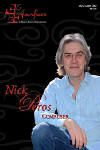Texte paru dans: / Appeared in: Code-barres / Barcode: 709861305131
|
|
|
Reviewer: Alan
Swanson The seemingly inexhaustible musical treasures in the National University Library in Turin have already provoked recordings of 22 of Vivaldi’s 51 known operas. He claimed to have written more than 90 but, of the ones we know a number are reworkings of earlier material or pastiches from his own music or that of other composers. If the title and the names of the characters do not lead one to expect an opera about China, it is worth remembering, as Frédéric Delaméa’s fine notes remind us, that this was a period of considerable European interest in the Orient in general and in China in particular. By the time of its first performance, in Mantua, on the day after Christmas, 1718, as part of the betrothal ceremonies for the Duke, Apostolo Zeno’s 1706 libretto had already been used 10 times. This is not surprising, as Zeno was the most popular librettist before Pietro Metastasio. As an opera composer, one cannot claim Vivaldi to have been an innovator. He worked comfortably within the musical and dramatic structural conventions of the then-dominant opera seria and its textual formulas were familiar. What he did bring new, however, was an imaginative sense of melody, orchestral color, and dramatic tempo.
This tale of exotic intrigue is surprisingly straightforward, with none of the subplots soon to become common operatic fare. Though direct, it is filled with intrigue and counter-intrigue, and in the first scene the tenor dies, clearing the stage for the high voices Vivaldi so liked. Briefly, the dying emperor Troncone gives his will to Ciro, his chief minister, and the imperial seal to Sivenio, a general, telling them to pass them on to his successor, whom we infer to be his son, Teuzzone, also a military man. Ciro, a soprano, and Sivenio, a baritone (and the only low voice before the very end of the opera), both love Zidiana, a mezzo-soprano betrothed to Troncone, who is really in love with Teuzzone but more deeply unhappy that she will not now become empress. Zidiana pulls them into a plot to bring this about by forging a new will declaring her empress, and by promising each that she will be his wife. They reckon without the opposition of Zelinda, a contralto Tatar princess also in love with Teuzzone, as is he with her. As must happen, the rest of the story works itself out through various complications to its necessary happy ending.
Zeno moves his story swiftly and compactly and, as is typical of the period, there is not much interior reflection; the (mostly da capo) arias often express action rather than contemplation and are short, and Vivaldi varies them cleverly but not extravagantly in the repeat. This was Vivaldi’s first opera for his new boss in Mantua, and he provided a score of constantly unfolding delight.
All the singers here are at their best and they receive first-rate support from Jordi Savall, who keeps things moving without leaving a sense of racing through the score. It is invidious to single out any one soloist, for they are all a pleasure to hear, and most appear from time to time in other parts of this recording project. But it is something of a surprise to hear Teuzzone sung here by a sopranista, since Vivaldi had, in fact, written the part for Margherita Gualandi, earning thereby, perhaps, the enmity of Giovanni Battista Carboni, a castrato who had sung the role in several of the earlier versions of the opera. There is no explanation for this choice.
The present recording is Savall’s second outing with Vivaldi’s operas: He recorded Farnace for AudioVox in 2001, whose recent reissue on Naïve was well received, with certain caveats, in Fanfare 33:4 by Barry Brenesal. This is the second recording of Teuzzone, as far as I can tell. An earlier one under Sandro Volta, which I have not heard and which seems not to have been reviewed in these pages, appeared on Tactus and has been newly reissued on Brilliant. I cannot imagine it being better than this one, which I recommend for those wanting to try the operatic Vivaldi. | |
|
|
|
|
|
|
|
Cliquez l'un ou l'autre
bouton pour découvrir bien d'autres critiques de CD |
|




